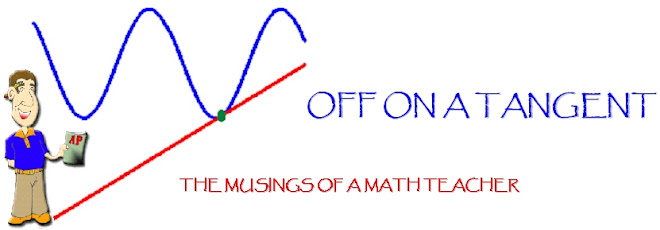 “It is nothing short of a miracle that modern methods of instruction have not yet entirely strangled the holy curiosity of inquiry.”—Albert Einstein
“It is nothing short of a miracle that modern methods of instruction have not yet entirely strangled the holy curiosity of inquiry.”—Albert EinsteinIn the U.S. math classrooms, the traditional method of teaching is under fire, whereby a teacher demonstrates a procedure, shows a few examples, and students are assigned many similar problems for skill and practice. This has merit in allowing student to become proficient practitioner and executors of very specific problem types, requiring very specific procedures. Well-trained students can that access their mental “list” of learned algorithms, and may even be able to apply them appropriately on structured, standardized tests that have little relevance to anything other than their obtaining their diploma.
This shortsighted type of teaching, although immediately pragmatic, does little to prepare the student for math tests. They often gain little real understanding of what they are doing and why they are doing it. Consequently they never learn to think mathematically, to experience the joy of discovery, and much less, to understand and appreciate the beautiful and great ideas of mathematics. The procedures they are memorizing have their genesis in a deeper, richer mathematical concept, idea, need or theory that were discovered by real people of great curiosity and desire to know. As a result, they come to view mathematics as a boring collection of rules that have no application to the real world, causing the math to become increasingly more incomprehensible as they advance through their coursework. It is no wonder they become less and less motivated and leave high school without numeric skills, agility, and confidence.
So why are we so entrenched in this teaching style? Culture, culture, culture. The teachers of today were taught the same way. It “worked” for them, it can “work” for the next generation, so on and so for ad infinitum. Those who inevitably become math teachers were those who became proficient with the algorithms and were able to climb the ladder of mathematical hierarchy without much trouble. They then have a hard time understanding why “others” can’t handle the procedures as they did. Our culture has an unspoken respect (if not resentment) for those who can “do” math. But math is so much more that a “do” subject. It is a “thinking” subject, if one is only willing to probe below the surface, something most current math teachers likely did not experience in their schooling. These teachers with little interest or a deeper understanding of mathematics will likely not be very enthusiastic about the subject, teach more fragmentally, and are less likely to adopt new, creative teaching methods, which might only reveal their inadequate understanding of the subject.
Also, our culture views mathematics as a progression from one “branch” to another. Teachers are expected to deliver the necessary skills to the students that will help be successful in learning the skills at the next level, with Calculus as the ultimate culmination of skill mastery. Students absorb this idea: they see math as a never ending sequence of courses that only get more and more abstract and complicated. The message we are sending is that we only value the habit of industry and work, rather than one of thought and discovery.
Another reason our culture values the current method is due to efficiency. Not only are lessons that focus on discovery and inquiry more difficult to plan, and require resources most teachers feel they don’t have, but they also take longer to implement. One cannot rush discovery, and after all, we have a mandated curriculum to get to (remember, the next course is coming next year!). Motivation and understanding, exploration and appreciation are sacrificed to the more efficient method of the teacher keeping pace by appropriately dispensing the curriculum in a timely manner, requiring the students to take the concepts on non-contextual, fragmented faith.
Efforts to change teaching methods are abound, but still focus primarily on isolated teaching techniques, rather than a paradigm shift in delivering the purpose and beauty of mathematics. The overall message is still the same. Without changing the message, we will never change the culture. Without changing our culture, we will never create the positive attitudes toward mathematics, we will never demystify mathematics, and consequently, we will never expose the students to some of the most profound and greatest ideas of humankind. We must first reform our attitudes before we can reform our methods.
As one of my old college professors, Michael Starbird, said about math: “Knowledge comes and goes, but hatred lasts forever.”






1 comment:
Being a new blogger, I would like to tell you that you have given me much knowledge about it. Thanks for everything.
http://www.maths-n-abacus.com/franchisee.html
Post a Comment